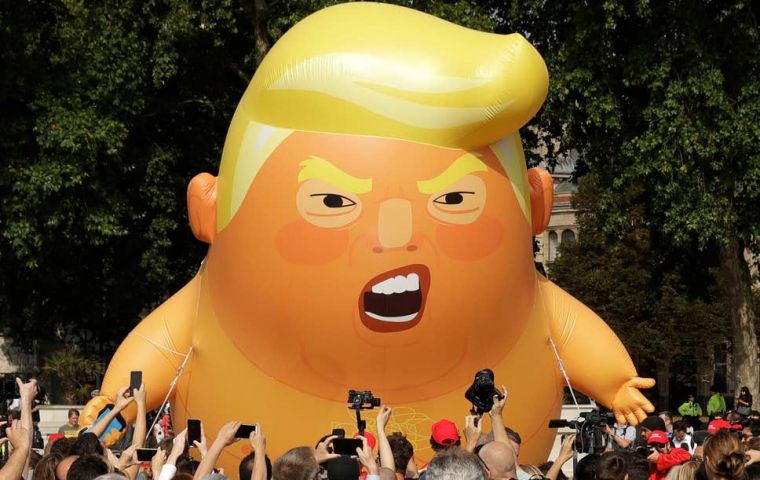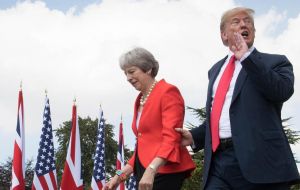MercoPress. South Atlantic News Agency
Trump begins a three-day visit to UK; besides the pomp, massive protests and the inflatable Baby await in London
 The visit has triggered calls for mass protests in London; demonstrations are planned in Trafalgar Square and floating the 20-foot inflatable “Trump Baby”
The visit has triggered calls for mass protests in London; demonstrations are planned in Trafalgar Square and floating the 20-foot inflatable “Trump Baby”  On Tuesday Trump and Mrs May hold talks and give a joint press conference in 10 Downing Street; later Trump will host a dinner at the US ambassador's residence
On Tuesday Trump and Mrs May hold talks and give a joint press conference in 10 Downing Street; later Trump will host a dinner at the US ambassador's residence United States president Donald Trump lands in London on Monday morning for a three-day visit. He will travel to Buckingham Palace, where he will be greeted by the Queen and her son, Prince Charles.
After a private lunch with the monarch, he will look at some of her artworks, and then travel to Westminster Abbey, where he will lay a wreath at the Tomb of the Unknown Soldier. Then, after tea with Prince Charles and his wife, he will return to the Palace for a state dinner.
Tuesday will see Mr Trump and Mrs May hold talks and give a joint press conference in her Downing Street office, and then Mr Trump will host a dinner at the US ambassador's residence. On Wednesday, the President will join the Queen and Mrs May in Portsmouth for a commemoration of the 75th anniversary of the D-Day landings.
The visit has triggered calls for mass protests in London, set for Tuesday. As well as demonstrations in Trafalgar Square, there will be the second outing on the 20-foot inflatable “Trump Baby” - a cartoonish depiction of the president wearing a diaper.
The roads in central London are being closed, the extra police are on patrol, and Britain is ready to welcome US President Trump. But in characteristic style, Mr Trump fired salvos at his hosts even before leaving Washington.
On successive days, Mr Trump led British headlines with his views on the country's political crises. Saturday (June 1) saw his observation to the Sun newspaper that former Foreign Secretary Boris Johnson would make an “excellent” prime minister. The next day, the Sunday Times reported his advice to Britain that Brexit Party leader Nigel Farage be appointed to negotiate Britain's departure from the European Union.
As he departed on Sunday, he also mocked London Mayor Sadiq Khan, ruling out a meeting because “I don't think much of him”.
But Britain is now accustomed to Mr Trump's approach to diplomacy. The calculations that the country's Conservatives are making about who should succeed Prime Minister Theresa May are complicated, and unlikely to be much swayed by a presidential endorsement. And neither Mrs May nor any of her successors are likely to let Mr Farage, a man who could pose an existential threat to their party, anywhere near a position of influence.
“We're quite used to the fact that he does the unexpected thing, and it's not going to affect the warmth of the welcome that we give him because Britain and America are two of the greatest friends you find anywhere on the planet,” Foreign Secretary Jeremy Hunt told CBS's “Face the Nation” on Sunday. “We've got to know the president a bit over the last few years.”
Mr Woody Johnson, the US ambassador to Britain, also played down the significance of Mr Trump's praise for Mr Johnson, telling the BBC's “Andrew Marr Show”: “He has known Boris for a long time, so I think what he's commenting on is just his knowledge of Boris as a person and all the meetings he's had with Boris. He said it's not an endorsement.”
As he left the White House on Sunday, Mr Trump said his trip “certainly will be very interesting”, given recent developments. He also noted Britain's request for a trade deal, saying that he thought “there's an opportunity for a very big trade deal at some point in the near future, we'll see how that works out”.
But for all the efforts that diplomats on both sides will make to insist that the visit is going smoothly, the coming days will see them on high alert.
“You never know what you're going to get with Trump,” said Professor Charles Kupchan, a Europe expert at the Council on Foreign Relations and Georgetown University professor who advised presidents Barack Obama and Bill Clinton on the National Security Council. “Look what happened in Japan.”
Mr Trump's visit last month also was built around ceremony - the ascension of a new Japanese Emperor - but while in the country the US President managed to threaten Japan on trade, and side with North Korea's leader Kim Jong Un in criticising Democratic presidential candidate and former US vice-president Joe Biden.
In the United Kingdom, most of Mr Trump's White House advisers are seeking to keep him focused on the pomp and circumstance of meeting Queen Elizabeth, and on honoring the role of the US and its allies in World War II, rather than trying to achieve any policy changes with Mrs May as she prepares to leave office or on inserting himself into the contest to replace her.
Mrs May also chose to emphasize the ceremonial aspects of the visit as she prepared to welcome the president. “As we reflect on our shared history and honor those who fought so bravely on the beaches of Normandy, we also look to the future,” she said in an e-mailed statement. “Our relationship has underpinned our countries' security and prosperity for many years - and will continue to do so for generations to come.”
Yet in the days leading up to the trip, Mr Trump has not simply offered support for Mr Johnson and Mr Farage. He has suggested meetings with the two men during his visit.
“He's been a friend of mine, he's been very nice, I have a very good relationship with him,” Mr Trump said on Sunday, referring to Mr Johnson. He said he also has “a very good relationship” with Mr Farage and with “many people over there, and we'll see what happens. But I may meet with them. They want to meet, we'll see what happens.”
The President called London's mayor Mr Khan “the twin of De Blasio, except shorter”, a reference to New York Democratic Mayor Bill De Blasio.
Ahead of his departure, Mr Trump repeated criticism of Mrs May's handling of Brexit negotiations. He also suggested that multiple candidates in the UK were angling for his support and that he could play a significant role in shaping who comes next if he chose to.
“If the president meets with one or two candidates and not others it is interference of a sort in British politics, and normally a president would avoid that, or make sure to meet them all,” Prof Kupchan said. “Trump is not known for observing diplomatic protocol and tradition.”
While Mr Trump weighs if and how much to insert himself into the contest to replace Mrs May, he continues to deal at home with the consequences of Russian interference in the 2016 elections and mounting calls to impeach him that stemmed from those probes.




Top Comments
Disclaimer & comment rules-

-

-

Read all commentsThere is absolutely no doubt that Trump suffers from cronic “foot in mouth” decease. Otherwise he would be far more cautious in his unheralded and totally unapropiate remarks, on whichever the subjects may be.
Jun 03rd, 2019 - 03:05 pm +1Running away from the problems back at home; aren't we?
Jun 04th, 2019 - 01:29 pm +1A second PRISON-Term???
Jun 08th, 2019 - 09:49 am +1Commenting for this story is now closed.
If you have a Facebook account, become a fan and comment on our Facebook Page!